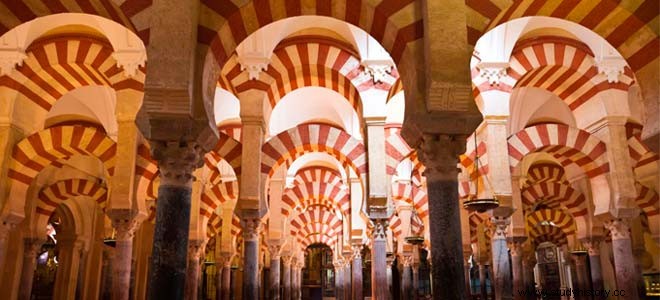The term Islam means, from the religious point of view, surrender or submission to God. The mosque was, in the Muslim world, the center of religious life . In the major mosques of the cities the faithful gathered to attend the Friday prayers. In the prayer that was celebrated in the main mosque of Córdoba, after the weekly sermon, the official communiqués from the emiral or caliphal power were read. Muslim believers obviously had various obligations, among which was the great pilgrimage to the holy places of Arabia. Also, the Muslims of al-Andalus had religious festivals, of which the main one was Ramadan .
As is well known, religious thought and beliefs were closely linked in al-Andalus. The introduction, at the end of the eighth century, of the Maliki doctrine, mentioned above, initially created a climate of greater rigidity. But the greater liberality shown since the mid-ninth century and especially during the Caliphate, as well as the connection with the East, explain the irruption in al-Andalus of other currents of thought that dissented from the official one, which placed them close to the heterodoxy. The doctrine that was most deeply rooted in Muslim Spain was mutazilism . The most significant dissident in this direction, without a doubt, is Ibn Masarra, who has come to be considered nothing less than the initiator of free thought.
Muslims, on the other hand, collected the rich cultural legacy of the Hellenistic world, as well as that of various countries in the Middle East . Abundant manuscripts, on literary or scientific subjects, circulated throughout the Islamic world. They were original works from the Arab world or texts collected from the Greek, Persian, Indian tradition, etc.

Literary Creation
Poetry reached a great boom in the field of literary creation . There was classical poetry, in which names such as al-Qastali, Ibn Suhayd or Ibn 'Abd Rabbihí stood out, and popular poetry, a genre that originated, during the 10th century, compositions such as the zejel the muwasaja . In the field of prose, a work of great value, belonging to the genre of ádab , is The necklace , a kind of encyclopedia, whose author was the aforementioned Ibn 'Abd Rabbihí. There were also first-rate grammarians in al-Andalus, among whom it is necessary to mention al-Qali, author of The Book of Dictations, or al-Zubaydi, to whom we owe, among other works, the book entitled The Book of the letter 'ayn. Important were, on the other hand, the works of history, which have names as distinguished as al-Razi, of which only a few fragments are preserved, although he was "the first to codify the rules of historical composition," as indicated by Lévi- provencal. Ibn al-Qutiyah also stood out in this field, who wrote a History of the conquest of al-Andalus , or al-Jusani, to whom we owe a History of the judges of Córdoba . It is not possible to forget an important anonymous work of the 10th century, the Ajbar Machmua . The descriptions of countries and regions, a field that geography anticipated, appear in authors such as al-Warraq, who wrote a work entitled The routes and the kingdoms , and al-Turtusi.
The Sciences
The sciences were widely cultivated in al-Andalus. In the field of mathematics, it should be remembered that the Arabs introduced in Hispanic lands, at the end of the 9th century, the numeration of Indian origin . A very famous mathematician was al-Mach-riti, known as "the Euclid of Spain" . Astronomy also reached great height, a field in which Ibn al-Samh excelled, who composed some well-known tables. Another discipline that experienced a notable boost in al-Andalus was medicine. Famous was Hasday ibn Saprut, of Jewish origin, who was Abderramán III's personal physician. It is also worth mentioning Ibn Yulyul of Córdoba, who wrote a Commentary on the names of the simple medicines of Dioscorides . But the best-known doctor in al-Andalus was al-Zahrawi, better known as Abulcasis, author of a work entitled Disposition of medicine for those who are not capable of knowing it for themselves , exceptional medical and surgical encyclopedia. They also had cultivators disciplines such as botany, zoology, alchemy or pharmacology.
